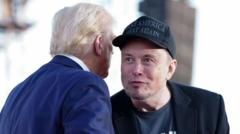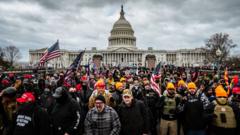Musk's position is expected to significantly influence U.S. policy and regulatory landscapes, aligning with his previous business strategies that center on efficiency and deregulation.
**Elon Musk Takes on New Role as Trump's Government Efficiency Advisor**

**Elon Musk Takes on New Role as Trump's Government Efficiency Advisor**
Billionaire entrepreneur Elon Musk has been appointed by incoming President Donald Trump to head the new Department of Government Efficiency, aiming to slash through federal red tape.
In a surprising move, Elon Musk, the billionaire CEO of Tesla and SpaceX, has been appointed by President-elect Donald Trump to lead the newly established Department of Government Efficiency (Doge). This appointment aims to streamline governmental processes, cut unnecessary regulations, and significantly reduce federal expenditures, with Musk stating he believes the federal budget could be slashed by at least $2 trillion from its current $6.5 trillion. Along with Vivek Ramaswamy, a former Republican presidential candidate, Musk has big plans to reshape federal agencies.
This advisory role is poised to not only allow Musk to exert influence over U.S. government policy but also positions him strategically in the regulatory environment that affects his enterprises. His past experiences running Twitter, now rebranded as X, hint at how he might operate within this new role—his tenure there was marked by dramatic workforce cuts and the implementation of revenue-generating subscriptions. The stark reductions in staff, as he cut X's workforce from about 8,000 to just 1,500, reflect Musk's push for maximum efficiency.
Additionally, his management of X has raised concerns about the proliferation of misinformation and hate speech, despite Musk's claims of political neutrality. His tenure has demonstrated a stark departure from conventional moderation practices, suggesting he may bring similar radical changes to government structure.
Political analysts note that Musk’s entrepreneurial background has already instilled a mindset geared towards minimizing bureaucratic overhead. However, the motivations behind his eagerness for government efficiency are complex—combining personal interests from his business ventures with ideological beliefs regarding governmental regulation.
Musk stands to gain personally from a deregulated environment as he navigates challenges related to Tesla's labor practices and the regulatory scrutiny surrounding SpaceX. Professor Christopher Phelps emphasizes that Musk's vested interests in the regulatory landscape add layers of conflict to his new role, elevating skepticism about potential biases towards his business ventures.
Moreover, Musk’s financial contributions and vocal support for Trump (amounting to an estimated $200 million in donations) indicate a mutually beneficial relationship, suggesting that his new role within Trump’s administration offers him the leverage he might need to influence policies that directly impact his business empire.
As the Trump administration prepares to take the helm, Musk's role as Government Efficiency Tsar may not only alter the federal landscape but also deepen the bond between tech innovation and U.S. policy, shaping a new era of governance reflective of Musk’s vision. His influence extends beyond efficiency promises, raising questions on the balance between personal interests and public policy in this unfolding administrative landscape.
This advisory role is poised to not only allow Musk to exert influence over U.S. government policy but also positions him strategically in the regulatory environment that affects his enterprises. His past experiences running Twitter, now rebranded as X, hint at how he might operate within this new role—his tenure there was marked by dramatic workforce cuts and the implementation of revenue-generating subscriptions. The stark reductions in staff, as he cut X's workforce from about 8,000 to just 1,500, reflect Musk's push for maximum efficiency.
Additionally, his management of X has raised concerns about the proliferation of misinformation and hate speech, despite Musk's claims of political neutrality. His tenure has demonstrated a stark departure from conventional moderation practices, suggesting he may bring similar radical changes to government structure.
Political analysts note that Musk’s entrepreneurial background has already instilled a mindset geared towards minimizing bureaucratic overhead. However, the motivations behind his eagerness for government efficiency are complex—combining personal interests from his business ventures with ideological beliefs regarding governmental regulation.
Musk stands to gain personally from a deregulated environment as he navigates challenges related to Tesla's labor practices and the regulatory scrutiny surrounding SpaceX. Professor Christopher Phelps emphasizes that Musk's vested interests in the regulatory landscape add layers of conflict to his new role, elevating skepticism about potential biases towards his business ventures.
Moreover, Musk’s financial contributions and vocal support for Trump (amounting to an estimated $200 million in donations) indicate a mutually beneficial relationship, suggesting that his new role within Trump’s administration offers him the leverage he might need to influence policies that directly impact his business empire.
As the Trump administration prepares to take the helm, Musk's role as Government Efficiency Tsar may not only alter the federal landscape but also deepen the bond between tech innovation and U.S. policy, shaping a new era of governance reflective of Musk’s vision. His influence extends beyond efficiency promises, raising questions on the balance between personal interests and public policy in this unfolding administrative landscape.





















